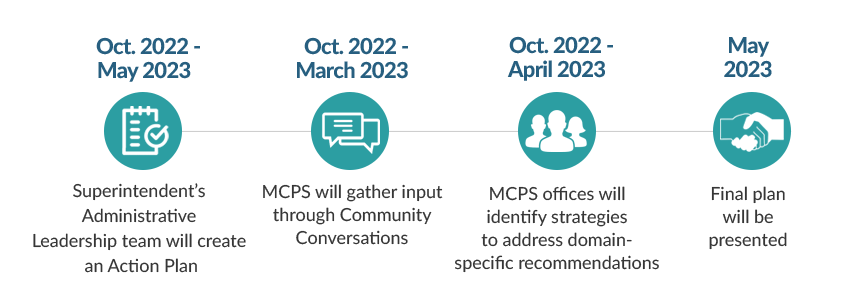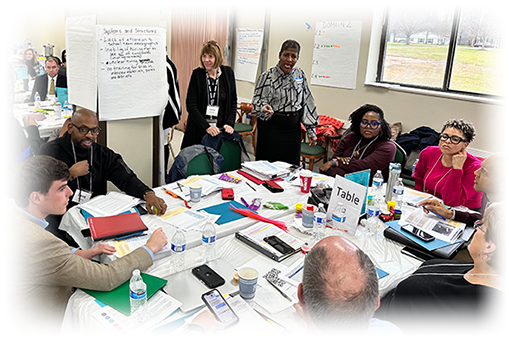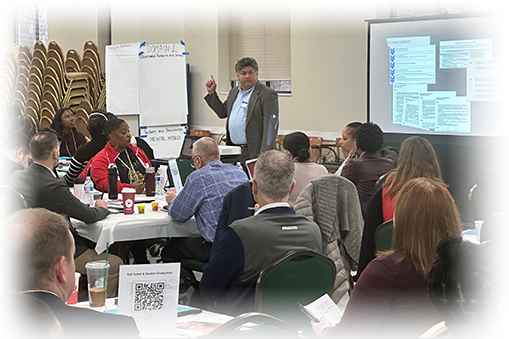Antiracist System Audit
About the Antiracist Audit
The Antiracist System Audit is a comprehensive and powerful district-wide review of Montgomery County Public Schools (MCPS) practices and policies based on input from more than 130,000 students, staff, and family members.
We asked MAEC to conduct this review because racial disparities can be seen in almost every area of MCPS including reading levels, participation in higher-level classes, graduation rates, suspension and discipline rates, and staffing. The report provides a comprehensive picture of how race impacts the experiences of students, families, and staff. “Overall, students, families, and staff of color reported having a less satisfactory experience with MCPS than other members of the community.”
Key Areas of Focus
The audit evaluated MCPS’s efforts toward achieving racial equity across the district, examining the following six key areas:
MCPS Antiracist System Action Plan
Translations of Action Plan:
English / Español / French / አማርኛ / tiếng Việt / Portuguese / 中文 / 한국어
Findings
The Antiracist System Audit report states that while MCPS has many good policies and practices, “the implementation of policies and application of best practices differs greatly from school to school, suggesting that the system is currently fragmented. The report goes on to say that, “the successful planning and implementation of a districtwide racial equity vision requires five elements:"
Coherence
MCPS should develop a theory of change centered on racial equity that “represents what matters most” to the district community.
Accountability for Racial Equity Work
Formalized community accountability measures and accountability metrics will provide greater transparency around how the district is enacting its stated racial equity goals.
Equity-Centered Capacity Building
MCPS needs to provide staff with more systematic and ongoing professional learning opportunities to address emerging racial equity issues in their respective roles.

Continuous Data Collection
MCPS must create mechanisms for continuous evaluation, data collection, analysis, and action-planning regarding racial equity.

Relational Trust
Relational trust allows different groups within the school community to mutually depend on one another to accomplish shared goals.
Current Action Steps
Below are some of the steps we have taken since receiving the report on October 11. They are organized into three areas:
District-wide Actions
All central office, operations, and school-based leaders are participating in required professional learning that began in February. The goal of the professional learning is to create a coherent system-wide approach to antiracism by ensuring all leaders have foundational skills to:
- Organize and lead professional learning communities that create the conditions for staff to effectively work together toward equitable outcomes.
- Respond to immediate challenges with antiracist and culturally responsive practices.
- Identify and interrupt policies and practices that lead to racially disparate outcomes for students, families, and staff.
- Effectively use data to develop, monitor, and evaluate policies and practices to ensure equitable outcomes.
- Engage all students, families, and staff using antiracist and culturally responsive policies and practices that lead to effective two-way communication and partnerships.
Domain-specific Actions
- The Long-term Action Plan will include actions to address all six domains. Before the actions are finalized, each MCPS department is developing pilot projects to address an identified issue most aligned with the work of that department.
- To ensure that the departments are creating effective pilot projects, all Central Services leaders participated in two full-day work sessions to develop the skills and structures necessary to analyze and address the Audit findings.
- Six cross-office committees, called charters, have been created to organize and streamline the pilot projects. The input from the Community Conversations will be used during the creation of the projects.
School-specific Actions
In addition to the district-wide findings, each school received a report with the outcome of their school-specific Audit surveys. The reports include responses from students, staff, and families. Schools will engage in the following process that will culminate with their School Improvement Plan.
- At a January 31 meeting, all principals were given expectations of how every school will use both academic achievement data and the results of the Antiracist System Audit to create an analysis or “data story” of what is specifically happening at their school. This process will take place in three phases between February and May 2023.
- Schools will get training this Spring on how to engage their community in analyzing their data and develop their School Improvement Plan.
Please watch the presentation on the Audit Report Findings and Recommendations
Importance of the
MCPS Anti-Racist Audit
Contact Us
Coming Soon
Community Conversations
Please attend a community conversation. We are collaborating with community partners, student organizations, and staff associations. This document will continue to be updated. Please continue to check back.
Contact Ashley Rhodes if your organization is interested in hosting a conversation.










